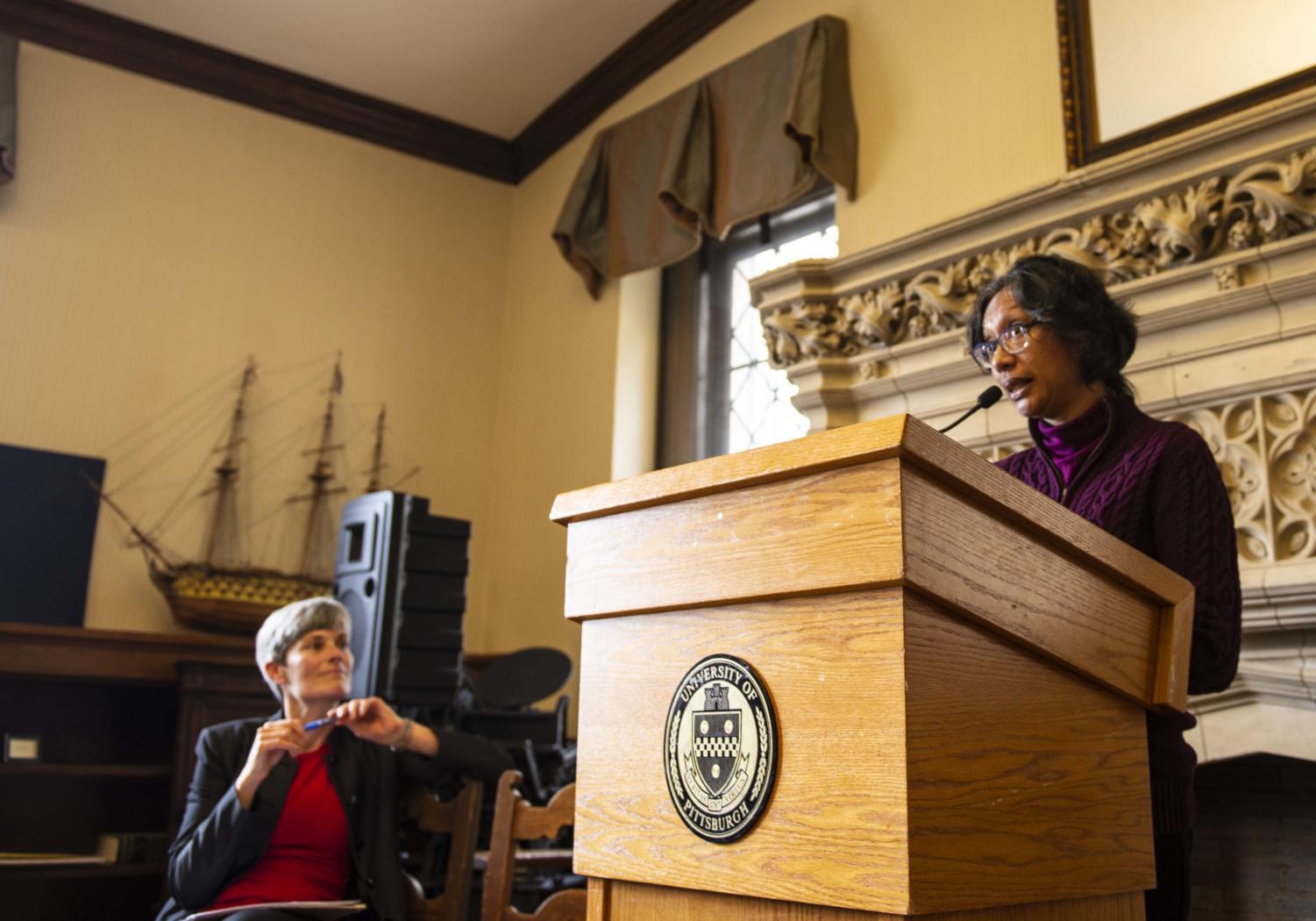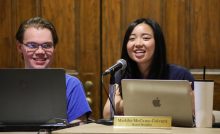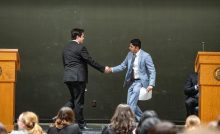“Green Speakeasy” environmental lecture comes with a drink


Amy Wildermuth (left) looks on as Shanti Gamper-Rabindran discusses current issues in environmental policy at the Green Speakeasy event in the University Club Library Wednesday afternoon.
Over the past two and a half years, the Trump administration has made a number of changes to environmental policy, loosening regulations on air pollution, offshore drilling and more.
So a group gathered on Wednesday at the University Club to discuss their concerns over drinks.
Several dozen lawyers, engineers, students and policy enthusiasts at Pitt met Wednesday afternoon to discuss the state of environmental protections at a “Green Speakeasy.” Attendees got two free drinks and snacks and attended lectures by University specialists in environmental policy, Amy Wildermuth and Shanti Gamper-Rabindran.
According to Wildermuth, the dean of Pitt’s law school, one of the major challenges for those seeking to protect the environment is the continued lack of any new substantial environmental legislation — especially legislation aimed at combating climate change. The Environmental Protection Agency functions on outdated legislation as a result, Wildermuth said.
“The last major environmental statute was in 1990. It means that we have statutes that by any measures, these laws, the Clean Air Act, the Clean Water Act, they are old. They don’t match up to what we think. There is no climate change law. Congress has not passed it,” Wildermuth said.
Wildermuth explained that the old laws are not as effective at combating modern problems because the nature of today’s environmental problems are different from the problems faced in the past. The means of combating certain environmental issues are also outdated.
“The EPA has done everything thing they can under the statute they are working under. However, the statute has certain limits,” Wildermuth said.
The lack of legislation is not the only problem facing environmental policy. Deregulation under the Trump administration has threatened numerous legislations. Wildermuth said that while Trump’s executive orders to deregulate make the news, fewer than 10% of the degregulations are a win for the Trump administration in the courts.
While this is a victory for environmental regulations, Wildermuth said the constant changes threaten the EPA’s operation. Environmental policy is slow and complex, and any quick changes disrupt the agency’s effectiveness to implement comprehensive policies.
Gamper-Rabindran, an associate professor at the Graduate School of Public and International Affairs, said in her lecture that one of the current dilemmas in environmental protection is the science transparency rule.
The EPA’s new guidelines of science transparency require any research study utilized in making major legislations to be “publicly available in a manner sufficient for independent validation.” The agency proposed the change in April 2018 with the stated goal of increasing transparency in policy formation, but some scientists are concerned about the implications.
Gamper-Rabindran said she believes the proposed legislation would affect greatly the types of studies that are taken into account when designing environmental policies.
“That means that most studies that establish the relationship between people and health cannot be taken into account because it relies on confidential data. It is very very difficult to make this data publicly available,” Gamper-Rabindran said. “This includes pesticides, air pollutants, food additive, whatever you can think of.”
Wildermuth said swift action needs to be taken by members of Congress. She argued that the courts are not the solution to climate change and environmental policies.
“I don’t think that the courts are an answer. If you are running up to court and saying that you should come up with the solutions to climate change, we are done. We need legislative solutions and fast,” Wildermuth said.
Erin Moran, a senior majoring in environmental science, said she thought the presentation was well rounded as it featured two distinct perspectives on climate change and environmental policies.
“I really liked how they went over the broad policies that made up the EPA,” Moran said. “It was really interesting that the presentation featured a lawyer and scientist — the two went back and forth about legislative measures. They both had a different perspective that was highlighted throughout.”
Maren said the speakeasy was extremely helpful in understanding the changes that regulations will have on the future.
“They gave a great presentation on how the new rules will impact science and how the changing perspective of science will impact policies in future,” Moran said.
Recent Posts
SGB introduces new governing code bill and addresses rumors of ICE on campus
At its weekly meeting at Nordy’s Place on Tuesday, Student Government Board introduced an omnibus…
Opinion | School should be in the summer
Although this may be controversial, I believe that from this data, it is evident that…
Weathering the storm: Pittsburgh teams have tackled some of the toughest environments
The end of the year in western Pennsylvania is always marked by two things —…
Notes From an Average Girl // Notes on Book Banning
In this edition of Notes From an Average Girl, senior staff writer Madeline Milchman writes…
To Be Honest // Yup, it is that damn phone
In this edition of To Be Honest, staff writer Evin Verbrugge writes about her phone…
Meaning at the Movies | Portraying Toxic ‘Adolescence’
In this edition of Meaning at the Movies, staff writer Lauren Deaton explores the mini-series…

